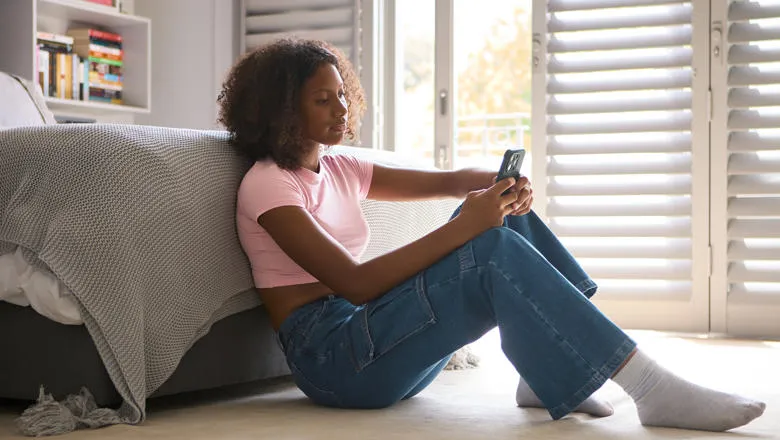Adolescent smartphone use is a huge concern for parents and carers. We found that problematic smartphone use was linked with anxiety, depression and insomnia across two separate adolescent age groups using two different research methods. By revealing the link between problematic use of smartphones and poorer mental health, and demonstrating that young people are aware of this problem and are eager to manage their use, these studies highlight the need for evidence-based interventions to help adolescents struggling with difficult behaviours around their smartphone use.
Professor Ben Carter, Professor of Medical Statistics at King’s IoPPN and the first author of both studies
01 August 2024
Teens with problematic smartphone use are twice as likely to have anxiety – and many are eager to cut down
Two new studies of smartphone habits in teenagers have identified links between problematic smartphone use (PSU) and depression, anxiety and insomnia. The research revealed that one in eight young people want help to reduce their smartphone use.

PSU describes a pattern of behaviours, thoughts and feelings linked to smartphones that resembles an addiction, such as feeling panicky or upset when the phone is unavailable, finding it difficult to control the amount of time spent on the phone, using for longer without feeling satisfied, and using the phone to the detriment of other enjoyable or meaningful activities.
Researchers at the Institute of Psychiatry, Psychology & Neuroscience (IoPPN) at King’s College London conducted two studies at schools, published today, investigating the association between PSU and mental health in young people. One study was with young people aged 16-18 years and the other was with 13–16-year-olds. These studies are among the first to evaluate PSU and mental health outcomes in adolescents.
Both studies were funded by the National Institute for Health and Care Research (NIHR) Maudsley Biomedical Research Centre.
Problematic smartphone use is linked to mental health
Overall, 18.7 per cent of 16-18-year-olds and 14.5 per cent of 13-16-year-olds self-reported PSU, with higher prevalence among girls.
Findings published in Acta Paediatrica revealed 16-18-year-olds who reported PSU were twice as likely to experience anxiety and almost three times as likely to experience depression compared to those who did not report PSU.
Findings published in BMJ Mental Health revealed nearly half of 13–16-year-olds with PSU reported symptoms of anxiety (44.4 per cent) compared to 26.4 per cent without PSU. Over half of 13-16-year-olds with PSU reported symptoms of depression (55.6 per cent) compared to 35.8 per cent without PSU. This study also investigated if PSU was associated with mental health over time and showed increases in PSU scores over a four-week period were linked to increases in self-reported anxiety, depression and insomnia.
In the first study, conducted in January 31st to 8th March 2020, 657 16-18-year-olds completed assessments of PSU, anxiety, depression and insomnia. In the second, researchers measured PSU and changes in anxiety, depression and insomnia in 69 13–16-year-olds over a four-week period in 2022.
Many young people want to cut down time spent on smartphones
Both studies also found that many young people wish to spend less time on their phones. Almost two-thirds of 16-18-year-olds reported that they have tried to cut down their smartphone use, and one in eight said they wanted help to reduce their use. Those with PSU were five times more likely to say they want help to cut down their smartphone use compared to their peers without PSU.
Similarly, nearly 90 per cent of 13–16-year-olds reported that they had attempted at least one strategy to limit their smartphone use, including putting it on silent or turning off notifications.
The researchers say the findings reveal that adolescents are aware that their smartphone use needs to be managed and are receptive to the idea of boundaries around use.
16-18-year-olds were recruited from five secondary schools across London, East-Midlands and South-West England. 13-16-year-olds were recruited from two secondary schools in London.
Distinction between smartphone use and screentime
In the first study, researchers also found TikTok and Instagram usage was higher among 16-18-year-olds who reported PSU, compared to those who did not. There was little difference in usage of WhatsApp, general gaming or general internet usage.
The study highlighted a distinction between PSU and screentime, described as the number of minutes spent on the smartphone rather than problematic behaviours surrounding its use. They found screentime was not associated with anxiety or depression in 16-18-year-olds, although did directly link to increased insomnia.
Strategies to reduce smartphone usage
Further analyses, also published by the researchers in a ‘Perspective’ article in Acta Paediatrica, revealed that putting their smartphone on “do not disturb”, turning off notifications, and leaving the smartphone in another room at bedtime were reported to be the most effective strategies for reducing PSU. In contrast, restricting access to specific apps, using a locked box during revision, and turning on greyscale were considered to be the least effective strategies.
The good news is that adolescents are reflective and insightful about their use – they understand that smartphones bring downsides as well as benefits. Many young people in our studies employed reduction strategies, showing they are already taking active steps to manage their smartphone use. They found silent mode, removing notifications and placing the phone in another room at bedtime as the most effective. These are the same strategies which university students found helpful to reduce smartphone use.
Dr Nicola Kalk, Visiting Senior Lecturer at King’s IoPPN, Consultant Psychiatrist at South London and Maudsley NHS Foundation Trust and senior author of both studies
Dr Kalk added: "We hope these findings encourage parents and carers to have a conversation with their adolescents about their smartphone use which acknowledges both benefits and harms, and allows them to explore reasons why their adolescent might want to reduce their use, as well as the most effective tools to do so."
“A multi-school study in England, to assess problematic smartphone usage and anxiety and depression” (Ben Carter, Mollie Payne, Philippa Rees, Sei Yon Sohn, June Brown and Nicola Kalk) was published in Acta Paediatrica. DOI:10.1111/apa.17317
“There’s more to life than staring at a small screen’: A mixed methods cohort study of problematic smartphone use and the relationship to anxiety, depression and sleep in 13–16-year-old students in the UK.” (Ben Carter, Najma Ahmed, Olivia Cassidy, Oliver Pearson, Marilia Calcia, Clare Mackie, and Nicola Kalk) was published in BMJ Mental Health. DOI: 10.1136/bmjment-2024-301115
“Problematic smartphone use: what can teenagers and parents do to reduce use?” (Nicola Kalk, Johnny Downs, Bruce Clark and Ben Carter) was published in Acta Paediatrica. DOI: 10.1111/apa.17365
For more information, contact Patrick O'Brien (IoPPN Media Manager).

